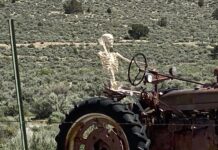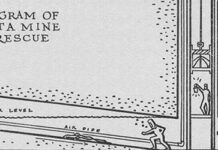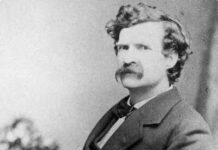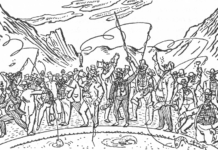Carson Valley has the distinction of being one of the most beautiful places on earth, just a half hour’s drive, via the Kingsbury Grade with its stunning views, from another of the most beautiful places on earth, Lake Tahoe. Last week I was in the Valley for an afternoon with nothing but pleasure on the agenda.
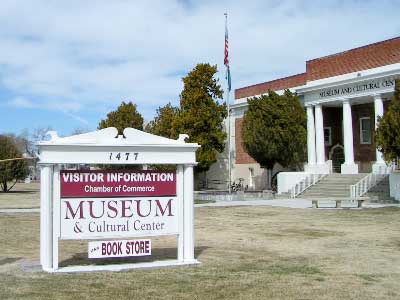 I began as you should do, at the Visitors Center, located in the former Douglas County High School on the east side of US 395 in Gardnerville.
I began as you should do, at the Visitors Center, located in the former Douglas County High School on the east side of US 395 in Gardnerville. 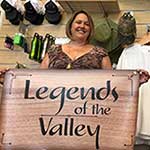 You should do this both for the practical information available about what awaits you here — lunch, for example — and for the Douglas County Museum, located just a few steps back down the hallway, to help put modern Carson Valley into the context of the pioneer era when it all began.
You should do this both for the practical information available about what awaits you here — lunch, for example — and for the Douglas County Museum, located just a few steps back down the hallway, to help put modern Carson Valley into the context of the pioneer era when it all began.
Genoa first blossomed in 1851 when John Reese opened what became known as Mormon Station at the base of the Sierra, a trading post serving California-bound wagon trains. Every visitor to the Valley should visit Genoa — food, drink, the Court House Museum, the old Mormon Fort State Park and B&B accommodations.
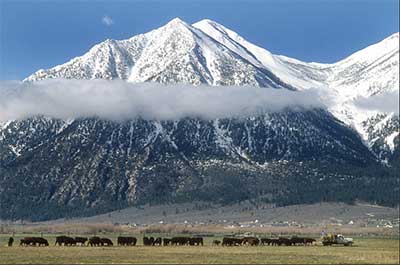
Gardnerville was established in 1879 at a crossroads nearer the center of the Valley, more convenient for commerce than the fading Genoa on the far west side.
In 1906 Minden was established on the north side of Gardnerville to accommodate the V&T Railroad line from Carson City. When much of Genoa burned in 1910, the county seat moved to Minden, still a tidy picture-book town built around the train station.
If you asked about lunch at the Visitors Center you’ll have a candidate or two on your mind — here’s their list to choose from. For me it was the Country Club on Gardnerville’s far south side, where I met with Gage Smith, our newly engaged connoisseur of Nevada’s Dirt Roads (see below). Gage posts to Facebook as Picon Drinkers of the American West and is an eloquent spokesman for the famous Basque elixir. I noticed he’d ordered one and asked him how it measured up.
“Georgia’s behind the bar right now, she worked for Carlos Irrabarren when he owned this place, and she has poured umpteen million picons. She’s a good picon hand and I know that I am going to get a good one here. A few years ago, I had the privilege of sitting in Carlos’ kitchen for a lesson in making picon . . . with the good stuff. My take away on that,” he said with an extreme Basque accent: “Stir the crap out of it!”.
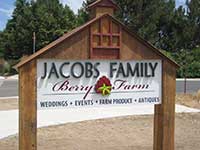 After lunch, back north into town on the highway to Sharkey’s, then west on Gilman Street about half a mile, around the sweeping turn to the south until St. Gall’s Catholic Church is on the left; turn left just beyond it, where you see the modest sign for the Jacobs Family Berry Farm.
After lunch, back north into town on the highway to Sharkey’s, then west on Gilman Street about half a mile, around the sweeping turn to the south until St. Gall’s Catholic Church is on the left; turn left just beyond it, where you see the modest sign for the Jacobs Family Berry Farm.
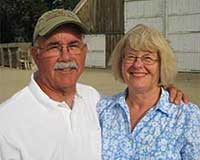 Diana and Jack Jacobs bought this parcel containing the headquarters of the old Lampe Ranch, and as an experiment devoted some former pastureland to seven rows of berries. There are now 25 rows and 16 different berry varieties, selected for flavor, climate compatibility and ripening schedule, and the farm is in the midst of its best season ever.
Diana and Jack Jacobs bought this parcel containing the headquarters of the old Lampe Ranch, and as an experiment devoted some former pastureland to seven rows of berries. There are now 25 rows and 16 different berry varieties, selected for flavor, climate compatibility and ripening schedule, and the farm is in the midst of its best season ever.
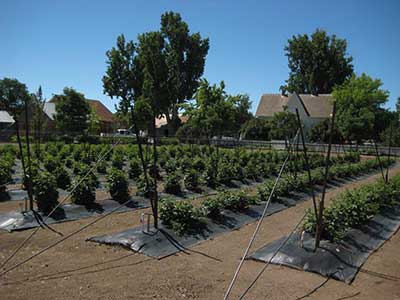 “We had a very cold fall last year,” Jack told me, “and we picked not quite 2,400 pints, our worst harvest since we established the farm. This year I believe we will pick over 5,000 pints — our Chester blackberry plants are full of berries, mostly red now but they will ripen over the next several weeks, giving us our biggest harvest ever.
“We had a very cold fall last year,” Jack told me, “and we picked not quite 2,400 pints, our worst harvest since we established the farm. This year I believe we will pick over 5,000 pints — our Chester blackberry plants are full of berries, mostly red now but they will ripen over the next several weeks, giving us our biggest harvest ever.
“Otherwise our black raspberry harvest is nearly done, along with the summer red raspberries. The autumn red raspberry plants are also loaded and we have started harvesting them and will continue until we have a sustained cold spell, typically the end of September or early October.”
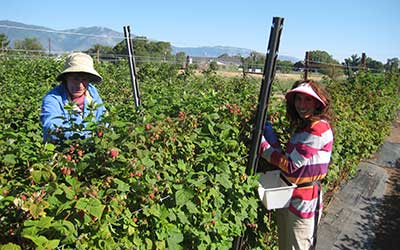 When Jack says ‘we’ have started harvesting them, he’s referring to Pietro and Vanessa, nearby neighbors in the Valley. With high schooler help from time to time, the two of them tend the vines and pick the berries (thus the importance of planting berries with staggered ripening cycles). They are skilled in every aspect of production and as Jack says, a major factor in the Berry Farm’s success.
When Jack says ‘we’ have started harvesting them, he’s referring to Pietro and Vanessa, nearby neighbors in the Valley. With high schooler help from time to time, the two of them tend the vines and pick the berries (thus the importance of planting berries with staggered ripening cycles). They are skilled in every aspect of production and as Jack says, a major factor in the Berry Farm’s success.
We’re standing in the small brick building that was once the Creamery, where a pair of large coolers contain the inventory of ripe berries, freshly picked, $8/pint. A woman visiting family in the Valley had noticed Jack’s sandwich board sign as she was driving to the grocery store and ventured in. She was from Oregon and has loved the flavor of fresh berries from childhood. She bought two pints of Chesters.
“Now if you don’t get to these right away,” Jack told her, “you may notice that they’ve lost their luster and gone a little dull, or even turned gray. When that happens, there’s only one thing to do —” She gazed at him with rapt attention. “Eat them!” he said, “That’s when they’re at their sweetest.” She left with a little skip in her step.
“Yesterday we picked almost 250 pints of blackberries,” he told me. “I want to move them quickly while they are fresh so we are offering a 25% discount for full flats (12 pints). That puts the price at $72.00 per flat. Our raspberries are in transition between summer and fall, so this offer is for blackberries only, and when the available flats are gone it will be over.”
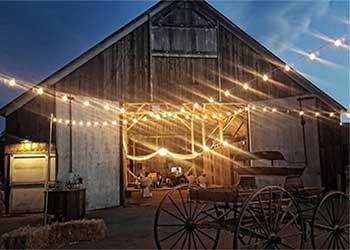 So, until sometime around mid September you can take advantage of this splendid harvest and make pies, jam or freeze the berries to enjoy all winter. The Farm is open 10-6 daily, closed Mondays. Call 775-783-4868 or send an email.
So, until sometime around mid September you can take advantage of this splendid harvest and make pies, jam or freeze the berries to enjoy all winter. The Farm is open 10-6 daily, closed Mondays. Call 775-783-4868 or send an email.
In gambling on berries, Diana and Jack created a productve side business as well. They now provide their bucolic premises for weddings, family and corporate events. We should all have such unintended consequences; they are fully booked up for Weddings and Events in 2019 and are taking reservations for 2020.
Dinner was with a friend in Minden and included the coming-from-behind of the beloved Phillies over the despised Red Sox.
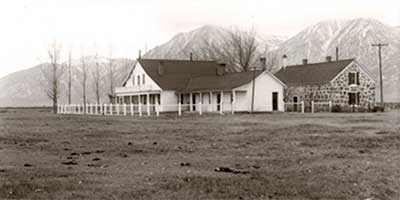 And then a drive toward the setting sun and the Historic Dangberg Home Ranch, at 1450 Highway 88, about ¾ mile south of the roundabout at the intersection with County Road. In addition to being a County-owned heritage site open for tours, the property presents a popular series of music and Chautauquas from May into October. On this evening it was Chautauqua, with Deke DiMarzo in full regalia portraying Alex Coryell, a Virginia City policeman who died in the line of duty in 1891.
And then a drive toward the setting sun and the Historic Dangberg Home Ranch, at 1450 Highway 88, about ¾ mile south of the roundabout at the intersection with County Road. In addition to being a County-owned heritage site open for tours, the property presents a popular series of music and Chautauquas from May into October. On this evening it was Chautauqua, with Deke DiMarzo in full regalia portraying Alex Coryell, a Virginia City policeman who died in the line of duty in 1891.
 “I’ve come to visit you from the grave,” he said to begin his performance and went on to give us a glimpse of a policeman’s life on the Comstock, starting with his uniform: the distinctive hat, the “Thunder” whistle, the billy club (but he didn’t twirl it). Coryell’s beat was the Third and Fourth wards at the south end of the city all the way to the Divide and including the “Barbary Coast” a blocks-long cluster of low dives and whorehouses on B Street, like the one it was named after in San Francisco.
“I’ve come to visit you from the grave,” he said to begin his performance and went on to give us a glimpse of a policeman’s life on the Comstock, starting with his uniform: the distinctive hat, the “Thunder” whistle, the billy club (but he didn’t twirl it). Coryell’s beat was the Third and Fourth wards at the south end of the city all the way to the Divide and including the “Barbary Coast” a blocks-long cluster of low dives and whorehouses on B Street, like the one it was named after in San Francisco.
Coryell’s career — and his life — was cut short on June 24 1891 when a miner named Dan Connors became an unwanted guest at one of the Barbary Coast deadfalls and had to be scuffled with, cuffed in front and walked along B Street to the Court House. But before he could be marched up the front steps and inside to the jail, Conners swung his cuffs into Coryell’s face, breaking his nose, and dashed north on B Street. Coryell ran after him but at the end of the block by Mooney’s Stable, he suffered a heart attack or a stroke, fell to the ground and died. He was 59.
And then Deke resumed his own persona and closed the show with a knockout a capella performance of “Danny Boy”. He made the welkin ring! — if this had been in a casino showroom instead of a temporary stage under a plastic canopy and the audience in folding chairs brought from home, there would have been a standing ovation.
Just another lovely day in beautiful Carson Valley.
Battle Mountain Speed Challenge
The fastest bicycles in the world, pumped by the fittest cyclists in the world, will be burning up Highway 305 south of Battle Mountain September 10th – 15th.
Teams from ten nations will vie to surpass the Human Powered Speed Challenge record of 89.59 mph that Todd Reichert of Canada set here last year.
The women’s record was set here in 2010 by Barbara Bautois of France at 75.69 mph. The record for the newly adopted category of Multi-track is 73.95 mph, held by Gareth Hanks of Australia.
A Visit to Goldfield by Gage Smith
For the casual traveler motoring along US 95, the slowdown for Goldfield is just exactly that . . . slow down . . . and slow down you must because Goldfield is famous for doling out speeding tickets to motorists who don’t heed the strict speed limits entering and leaving this dusty town.
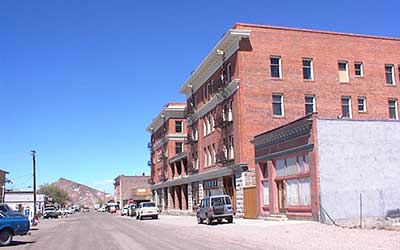 But there is more to Goldfield, and as motorists drive through the old buildings call out. Something big happened here but when? And why did it go away? Goldfield is a town rich in Nevada history and lore but the empty streets and boarded up buildings just hint at what really happened here in the early part of the 20th century.
But there is more to Goldfield, and as motorists drive through the old buildings call out. Something big happened here but when? And why did it go away? Goldfield is a town rich in Nevada history and lore but the empty streets and boarded up buildings just hint at what really happened here in the early part of the 20th century.
Once a year, on the first weekend in August, Goldfield once again comes alive with the annual Goldfield Days celebration.
This is the second time I have attended this event with the first one being three years ago. 2018 Goldfield Days was much bigger and much better.
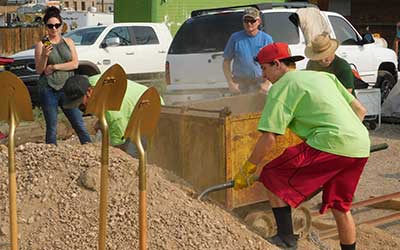 The event list that revelers could partake in was extensive beginning with the mucking contest where contestants, vying for a coveted gold shovel, filled an ore cart as quickly as they could with loose dirt.
The event list that revelers could partake in was extensive beginning with the mucking contest where contestants, vying for a coveted gold shovel, filled an ore cart as quickly as they could with loose dirt.
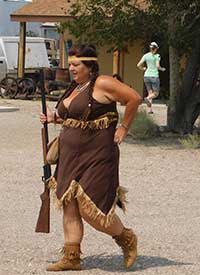 Following the mucking was the annual parade down Goldfield’s main drag. Twenty five entrants in total ranged from old cars, old people, people dressed in period garb, fire trucks, ATVS and even a few race cars were thrown in. Bands played, flags were waved and candy was thrown liberally for the young uns along the route.
Following the mucking was the annual parade down Goldfield’s main drag. Twenty five entrants in total ranged from old cars, old people, people dressed in period garb, fire trucks, ATVS and even a few race cars were thrown in. Bands played, flags were waved and candy was thrown liberally for the young uns along the route.
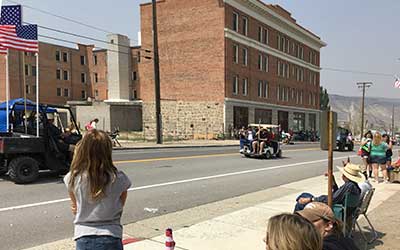 The centerpiece of this celebration is the annual Esmeralda County’s delinquent property tax auction which began right after lunch. The list of properties ranged from in town lots to patented mining claims to other parcels scattered over this 3500 square mile county. Many of the properties aroused some spirited bidding!
The centerpiece of this celebration is the annual Esmeralda County’s delinquent property tax auction which began right after lunch. The list of properties ranged from in town lots to patented mining claims to other parcels scattered over this 3500 square mile county. Many of the properties aroused some spirited bidding!
Unique to this years celebration were the tours of the old Goldfield Hotel. There has been some renovation activity and the owners offered tours of the first two floors. Impressive is a word that comes to mind . . . not only for the hotel itself but the work that has been put in to it. I hope that someday this grand old lady of Goldfield throws open her doors and welcomes guests once again.
The list of activities during the two days is too much to list here but the Poker walk was a favorite with the winner pocketing $300!
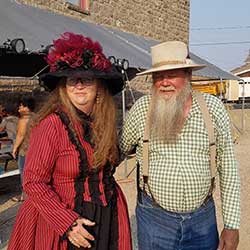 There were several money raising raffles in progress during the weekend, the biggest being promoted by the Goldfield Chamber of Commerce. For a buck, you could buy a chance to win a solid gold one oz. gold bar. That was just the grand prize of an extensive list of prizes.
There were several money raising raffles in progress during the weekend, the biggest being promoted by the Goldfield Chamber of Commerce. For a buck, you could buy a chance to win a solid gold one oz. gold bar. That was just the grand prize of an extensive list of prizes.
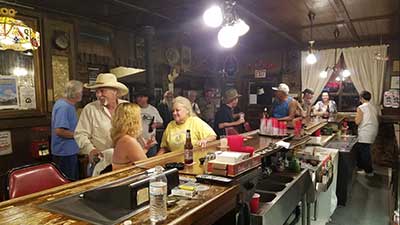 Of course, Goldfield’s two saloons, the Santa Fe and the Hoist House were jumping all weekend with music and just plain socializing with friends new and old. There was dancing (at least at the Santa Fe) into the wee hours of Sunday.
Of course, Goldfield’s two saloons, the Santa Fe and the Hoist House were jumping all weekend with music and just plain socializing with friends new and old. There was dancing (at least at the Santa Fe) into the wee hours of Sunday.
Goldfield is approaching another pivotal event in its history. It’s no secret that the new I-11 will bypass Goldfield, dealing yet another economic blow to this community. County leaders are trying to be proactive in making Goldfield a destination for history seekers, the curious and anybody else that is interested in the rich and colorful history of this area.
I’ve already marked my calendar for next year’s event.
![]()
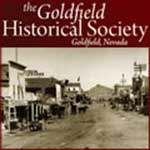 When Gage Smith isn’t rousting around the Nevada back country, he is posting to his Facebook page, Picon Drinkers of the American West. Now he will also provide a monthly NevadaGram dispatch about the finery of Nevada’s favorite Basque drink and unique commentary about his travels along Nevada’s Dirt Roads.
When Gage Smith isn’t rousting around the Nevada back country, he is posting to his Facebook page, Picon Drinkers of the American West. Now he will also provide a monthly NevadaGram dispatch about the finery of Nevada’s favorite Basque drink and unique commentary about his travels along Nevada’s Dirt Roads.
Editor’s Choice —
|
What They’re Saying About Us — Javi Perez of San Antonio (TX) Channel 5 booked a Junket flight to Wendover and loved it.
Five Years Ago in the NevadaGramFirst Train to Winnemucca
That night the more peacefully inclined Winnemuccans would resignedly give up all thoughts of sleep as choruses mounted in the favorite: “Oh, for a home in a big saloon, on the banks of some raging canal.” Black eyes and broken noses often identified the celebrants on the morning after. |
Overheard at Gema’s in Beatty: “In the USA there are probably half a million Mexican restaurants and not a single Canadian restaurant. And it turns out there aren’t any in Canada either. In even a small city like Victoria you can find food from everywhere around the world — even Tibet — but if you want blubber and beans you’re out of luck.”
Ten Years Ago in the NevadaGramThere’s a glow around Joe Robinson’s house in Hawthorne these days — his son Rocky set a new world’s record motorcycle speed record on the Bonneville Salt Flats last month, and Joe can’t get the grin off his face. |
15 Years Ago in the NevadaGramI drove north from Tonopah, and as I was accelerating out of Mina I saw an old man standing by the side of the road, his luggage (a plastic bottle full of pocket change and a carton of Pall Malls) at his feet. He was wrapped in a greasy blue jacket and a pair of gray sweatpants, barely standing up, actually supporting himself with the flimsy plastic marker sign, looking as if a gust of wind would bowl him over, and send him blowing across the sagebrush like a tumbleweed. He was going to Hawthorne. As I helped him into the car I saw he had stuffed his chapped and swollen feet into a pair of bedroom slippers. Was he 70 years old? 80? I don’t know. His voice-box had been rubbed smooth by decades of Pall Malls and alcohol and he didn’t have a lot of energy to push air through it anyway, so I couldn’t understand most of what he said. Off we went, and he mumbled quietly about this and that. “I’ve got four pockets in these pants, and $400 worth of gold coins in each pocket”, he said. He showed me a roll of gold coins and offered me one for the ride. For a hilarious moment I felt like a bizarro Melvin Dummar with Howard Hughes. I took him to the El Capitan, carried his ‘luggage’ through the casino and tucked him into a restaurant booth. He ordered some food, and I went back outside, into the car and back on the road. Alone now, no more Howard Hughes. I decided I’d done the right thing. He was fragile and weak, but he knew where he was, he knew what he wanted and he could pay his way. And if it turned out he needed more help than a ride and a hand into the restaurant, the folks at the El Cap were well equipped to get it for him — the El Cap has been the community triage center for a couple of generations now. |
Parting Shot —
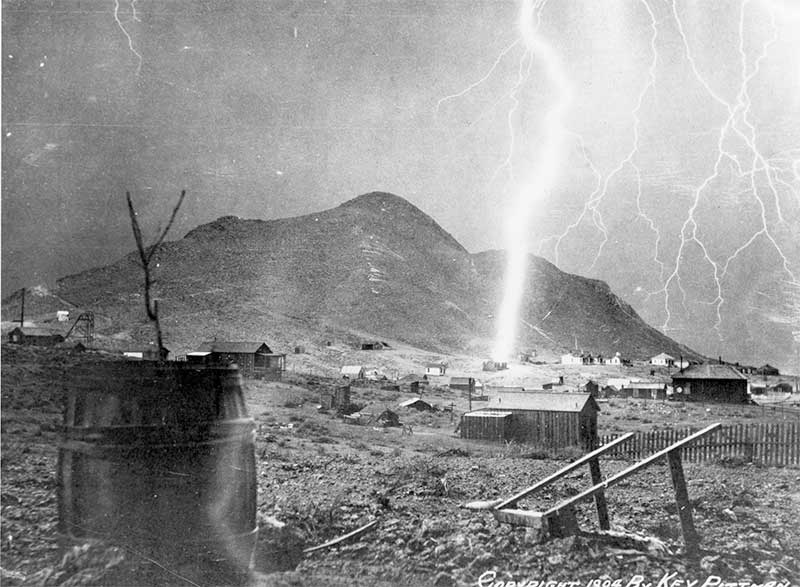
Lightning strikes in Tonopah, 1904 — Photo by Mimosa Pittman



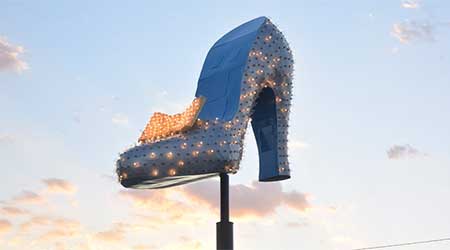
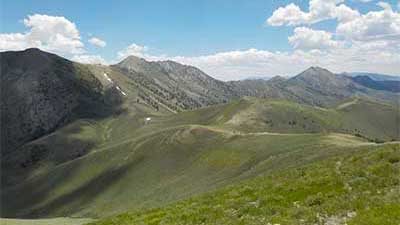

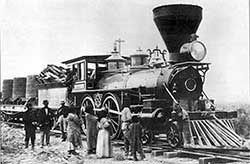 When the first through train, with four carloads of notables, arrived on May 11, 1869, the town put on a celebration suitable to the occasion — firing guns, blowing horns and whistles, ringing bells, driving souvenir spikes, and drinking champagne — the usual drink of early Nevada when it wanted to show it could spend with kings. From then on, the one regular town spree came on the day the Central Pacific pay-car came through.
When the first through train, with four carloads of notables, arrived on May 11, 1869, the town put on a celebration suitable to the occasion — firing guns, blowing horns and whistles, ringing bells, driving souvenir spikes, and drinking champagne — the usual drink of early Nevada when it wanted to show it could spend with kings. From then on, the one regular town spree came on the day the Central Pacific pay-car came through.
